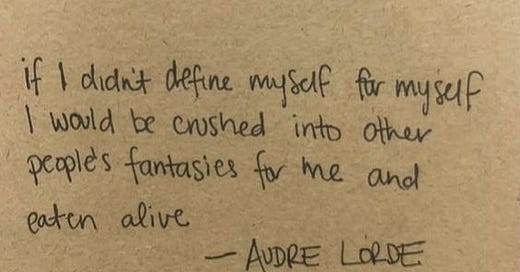To be perceived, or to not be perceived: the want to be perceived how you feel.
If I want you to see me how I see me, then what?
I’ve always been told I’m a sound person—or someone who possesses a grand knowingness of themselves. Though, I believe a lot of Black women are coupled with this acknowledgment. Stating that we have this “grounding energy” or are “very self-aware”. With this being a general perception I’ve encountered I’ve also seen how this ( along with many other perceptions) has put me in a box that I cannot control the amount of which I’m perceived by.
People always view me as strong, so when I’m weak people think I’m failing. I’m consistently happy, so when I’m sad, people feel less obligated to hold the same space I hold for them when they feel the same. The examples are limitless at this day in age. This battle between how feelings juxtapose perception is truly an anomaly. I feel as though I’m pretty, but in some of my past environments, I was made to feel like everything but. I’m upset because they hurt my feelings, but they’re telling me I’m being overdramatic. This action leads to walls of confusion and doubt in oneself because they are constantly being faced with this intersectional gaslighting of sorts. It begins to be this built muscle that’s trained to force an individual to choose whether they act on their feelings or by how they know they’ll be perceived.
How does one make decisions using both consciousnesses without feeling they’re abandoning or prioritizing one more than the other? There are times when our feelings definitely shouldn’t be prioritized—whether that be because we ourselves aren’t the center of the issue, or if there’s a goal that we’d like to reach with minimal conflicts. Just as though there are times where perception matters—like the probationary period of a new job, or even a first date with that one person you’ve been eyeing for a long time.
Though what this inner dialogue doesn’t initially recognize is that this juxtaposition is actually a continuum, or something that should be evaluated as an “and” not an “or”. Once an individual is able to address their feelings and thoughts of perception, that is what leads to a new elevation of mental freedom. This of course, is easier said than done. Many people who I’ve read that write about topics like these don’t address the harsh realities of some. There are other interceptors to this continuum that in some ways force the individual to not be able to address feelings and thoughts of perception in a way that’s beneficial for their mental health. Kids, finances, and overall quality of life can intercept this desired praxis.
Referring back to this built muscle in the force of choice, there’s a process of unlearning that goes with this narrative. What should be a priority in this praxis is understanding what it means to feel and address one’s emotions. One cannot succeed in this understanding if they cannot acknowledge, express, and embrace their emotions. If one spends more time analyzing their counterpart’s perception it leads to a souring of one’s pure feelings. This souring could mean brushing one’s feelings away or even adapting other’s feelings as their own. Allowing this to occur only leads to becoming impressionable and an ultimate deterrence of overall mental health.
I found myself even doubting or prioritizing other’s perceptions of me and my decisions when things went well. There’s always a concentration on when things are tough, but rarely ever do those speak on how these emotions impact when things go well. For instance, when I got my dream internship in New York City, I waited to tell the world because I didn’t want to hear the potential negative comments about how people perceived my past work and leadership. With past crushes (and even currently) I fail to initiate clarifying conversations about my feelings because I fear confronting those perceptions in real time.
This overall battle lays a foundation that leads to things like imposter syndrome, or a passive disassociation of self that one may not be cognizant of until they are reaching a point of anger or discomfort that one cannot leverage to regulate back to a healthier space.






Love this piece. It’s a conversation I have with myself daily. Well written!